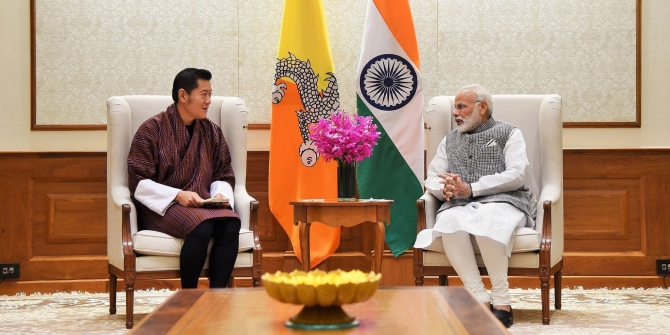As agricultural production moves from subsistence to cash-cropping, and educational achievement increasingly becomes fixed to social and economic advancements, young adults with disabilities are at risk of being excluded from Bhutan’s economic and social progress. Here Matthew Schuelka (University of Birmingham) explains how his new research project is supporting the presence and participation of persons with disabilities in economic development in Bhutan.
Tshering Dorji lives in a remote village in eastern Bhutan, at least a day’s walk to any road. Even then, road conditions are poor and there are frequent landslides that can block travel for days, even weeks. He lives on the side of a mountain, as do most in this country that sits nestled in the Himalayas. These realities alone make for a challenging existence, but Tshering Dorji is also someone who lives with cerebral palsy and has difficulty walking and controlling his limbs and face. Many people in Bhutan like Tshering Dorji spend their lives in or near their family houses. Most are not economically active, but that is not to say that they have socially isolated lives. While some certainly are isolated either by circumstance or by stigma, many other persons with disabilities (young and old) in Bhutan spend their days at the village lakhang [Buddhist temple], for example, providing cultural and religious continuity during changing times.
Bhutan is a country still in transition to a modern economy, for better or worse. It is also a country with ‘modern’ societal institutions such as health and education that has – as in other countries – displaced those services away from families and communities to deliver. The social and economic ‘cost’ of Tshering Dorji is increasing in the 21st century as agricultural production moves from subsistence to cash-cropping, and educational achievement increasingly becomes fixed to social and economic advancement. In many ways, Tshering Dorji cannot afford to just sit at home without economically participating in his family and community’s shared prosperity. However, what is also lost in this transitioning society? If we only value Tshering Dorji for his economic output, do we also de-value his contribution to community culture and religion? If everyone in the 21st century ‘modern’ economy must make an enterprise of themselves (Peters 2001), who is left to tend to the village temple? What does it mean to value one’s community participation, if it is only viewed within economic terms? If we are to value economic output for all citizens, how can we support a more inclusive and equitable system? These questions, and many more, and what we are exploring in Bhutan at the moment.
In June of this year, we launched a new project in Bhutan to support social and economic inclusion for young adults with disabilities. This project is funded by the UK Government’s Global Challenges Research Fund and titled, ‘Understanding, Developing, and Supporting Meaningful Work for Youth with Disabilities in Bhutan: Networks, Communities, and Transitions’ (ES/S004319/1). This project is a partnership between the University of Birmingham, Royal Thimphu College (Bhutan), and the University of Minnesota Institute on Community Integration (USA). In this blog post, I will outline the global challenge of social and economic participation for adults with disabilities, argue that making improves in this area matters to greater society, and explain a few things that we are doing within this project to address this challenge – both for Bhutan, as well as around the world.
The presence and participation of persons with disabilities in economic development in low and middle-income countries has significant potential for positive societal impact. It is estimated that access to vocational education for persons with disabilities can generate wage returns of up to 20%, and their participation in the labour market can lead to aggregate total household gains of billions of dollars annually (Banks & Polack 2013). The exclusion or limitation of the participation of persons with disabilities in national economies is estimated to significantly reduce productivity and tax revenue; and supporting greater economic participation of persons with disabilities would bring in more money than it would cost. Despite these promises, the relationship between disability, poverty, and inequality is significant. Globally, full or meaningful employment for persons with disabilities remains staggeringly low compared to the general population (UNESCAP 2018)
Bhutan faces serious economic and social challenges as a result of increasing youth unemployment and underemployment. In the urban areas of Bhutan, youth unemployment is 23%, and in rural areas 10% (MoLHR 2017). As estimated by the Bhutanese 11th Five Year Plan, the youth population (16–24) is expected to increase 80% by 2030. One of the Royal Government’s top priorities, reflected in the 11th Five Year Plan is to bring the unemployment rate down to healthy and sustainable levels. A particularly marginalized group in Bhutan – and, I would argue, a missed opportunity for increased economic activity and productivity – are youth with disabilities. Officially, youth with disabilities are classified by the Bhutanese government as being ‘economically inactive’ (MoLHR 2017) – with 10,000 (5%) categorised as disabled (MoLHR 2017). Access and participation to tertiary education and technical and vocational education and training (TVET), let alone transition from secondary school to post-school activities, are also very negative outcomes for youth with disabilities in the country. In addition, mismatches between the demand for and supply of skills in vocational and higher education, and limited growth of the private sector have inhibited employment generation.
In response to these growing economic and social challenges, the Royal Government has released a series of plans, namely the National Workforce Plan 2016–2022, the TVET Blueprint 2016–2026, and the Education Blueprint 2014–2024. These plans only marginally include youth with disabilities. The TVET Blueprint admits that more understanding is needed: “Unfortunately, not much is known about those with disabilities or from disadvantaged groups” (p. 26). Through this project, it is our intention to support both the Royal Government and Civil Society Organisations in their understanding and recognition of the importance of better outcomes for youth with disabilities. Addressing the existing barriers and challenges related specifically to those youth with disabilities, from inclusive educational practices through to inclusive employment, has a significant potential to support the realisation of Bhutan’s aspiration to achieve the development philosophy of Gross National Happiness (GNH).
Currently, we have a team of intrepid Bhutanese researchers spread out across the country gathering data. They are battling the challenges of monsoon season – including landslides, disintegrating roads with 1000m drops, and giant leeches. We are administering a nationwide survey to understand the current economic and social opportunities and barriers for young adults with disabilities (both for persons with disabilities themselves, as well as for employers), and we seek to highlight success stories as well as the daily lived experiences of persons with disabilities in Bhutan. We are administering our surveys using GPS mapping technology, so that not only can we analyse survey results using inferential statistics, we can also use spatial analysis to determine attributes such as the distance to labour market, distance to basic services like education and healthcare, and the relative ‘size’ of people’s community lives. In the autumn, we will continue to follow-up with participants via community focus groups.
In phase two of this project (2020–2021), we will trial several interventions and toolkits, including: an employment assessment toolkit, hiring coordinators for various educational and economic sectors to support inclusivity and participation, training and sustaining Bhutanese inclusive ‘champions’ to work in local communities, offering a micro-grant scheme to support economic participation and entrepreneurship, and working directly with young adults with disabilities themselves to support their training and participation. The purpose of these activities is not to specifically find the one thing that ‘works’, but rather to explore how a multitude of small-scale activities and interventions can work towards an overall more inclusive society. We seek to do this is a socio-culturally appropriate way in Bhutan, and want to promote the notion that social and economic development, values, and priorities in low and middle-income countries do not have to look the same as the experiences in ‘developed’ Global North countries.
To return to Tshering Dorji, we will work with him to support the kind of social and economic participation that he dreams for himself. Through this project, we want to highlight that persons with disabilities like Tshering Dorji – both in Bhutan and everywhere – are more than just ‘economically active’ or ‘economically inactive’ citizens. They should be valued for their participation and contribution to their communities, which may or may not be in the form of cash money. Afterall, this is perhaps the greatest contribution that Bhutan itself has given to the world: the notion that we have to judge the ‘success’ of societies not just on economic indicators alone, but also on the happiness of its citizens.
This article gives the views of the author, and not the position of the South Asia @ LSE blog, nor of the London School of Economics. Please read our comments policy before posting. Featured Photo Credit: Author.







